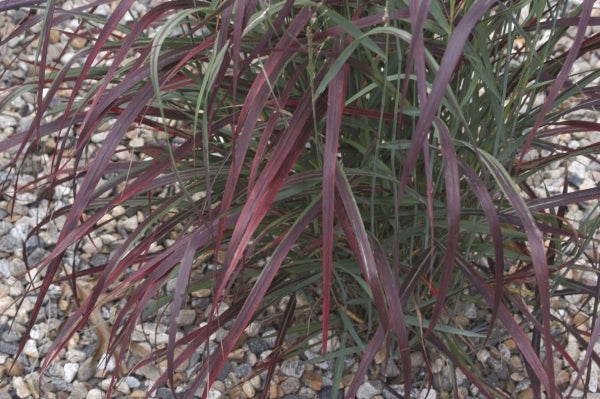Panicum virgatum 'Ruby Ribbons' PP 17,944
Ruby Ribbons Switch Grass
Item #: 8334
Zones: 4a to 8b, at least
Dormancy: Winter
Height: 48" tall
Origin: United States
To be alerted when this plant is back in stock, log in and add it to your wishlist. You will receive an email when it is available.
Panicum 'Ruby Ribbons' came about thanks to the breeding program of University of Connecticut's plant breeder, Dr. Mark Brand. His deer-resistant hybrid (Panicum 'Heavy Metal' x Panicum 'Hans Herme') produces a 4' tall, upright specimen emerging with blue-grey foliage that begins taking on a burgundy-red hue as early as midsummer. The foliage color intensifies as the season progresses, serving as a nice foil when the clumps are topped with airy 4' tall flower spikes in late summer, which dry and last well into the winter. The plant was actually named with the invalid and stupid cultivar name 'RR1', so we have made their trade name the official cultivar name.
Maintenance:
Panicum virgatum 'Ruby Ribbons' is a low maintenance perennial when grown in full, bright sun. The only maintenance needed in the garden is to cut the old foliage to the ground in late winter/early spring, just before the new foliage begins to emerge. The tan color and structure of most Panicum virgatum clones remains quite good through the winter as a great design element.
Growing Conditions:
Panicum virgatum cultivars grow well in a wide range of conditions from moist soils to very dry soils. Northwind switchgrass also grows in both acidic and alkaline soils. The other for being successful with switch grass is full bright sun for more than 4 hours a day.
If your 'Ruby Ribbons' clumps get too large, they can be divided, which is best done in fall and winter after they have been cutback.
Natural Impact:
Panicum virgatum is frequented by butterflies and birds, and is the larval host of several skppers (butterfly relatives).

-
Other Attributes
Genus: Panicum
Flower Color: Brown/Tan
Container Role: Thrillers
Garden Themes: Cottage Garden Plants
Other: Butterfly Attracting Plants , Cut Flower Plants , Deer Resistant Plants , Drought Tolerant Plants , Florida Native Plants , Georgia native plants , Groundcovers , Pollinator Plants , North American Native Plants , North Carolina Native Plants , Ornamental Seed or Fruit , Rain Garden Plants , Salt Tolerant Seaside Plants , Texas Native Plants , Colored Foliage , United States Native Plants , Plants Retiring This Year


